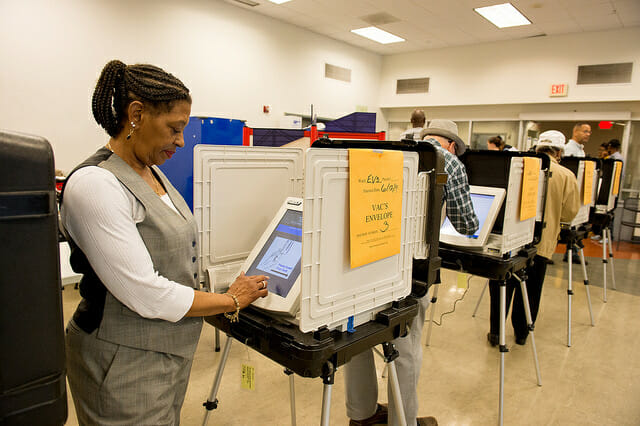Supreme Court: Voters Who Skip Elections Can Be Purged From Rolls
The 5-4 decision upholding Ohio's voter registration practice has major implications for voting rights nationwide. A woman votes in Maryland in 2014. (Maryland GovPics / Flickr Creative Commons)
A woman votes in Maryland in 2014. (Maryland GovPics / Flickr Creative Commons)
The Supreme Court on Monday upheld Ohio’s efforts to purge its voter rolls, a 5-4 ruling with broad implications for voting rights in multiple states ahead of the 2018 midterm elections.
Ohio sends notices to registered voters who have not voted in a two-year period. If voters fail to return the notices and do not vote in another election for four years, Ohio cancels their registration.
The court’s conservative majority held that this practice does not violate federal voting rights laws. Ohio defended its practice by citing a provision of the 1993 National Voter Registration Act that states can remove potential voters from their lists and cancel registrations if they move.
The case centered around Larry Harmon, an Ohio resident who sat out the 2012 presidential election, as well as the 2010 and midterm elections, but wanted to vote on a ballot initiative concerning whether to legalize marijuana. When he tried, Harmon found his name had been purged.
An Ohio appeals court ruled in Harmon’s favor in 2016, saying, as The New York Times notes, “Ohio had violated the National Voter Registration Act of 1993 by using the failure to vote as a ‘trigger’ for sending the notices.”
On behalf of Harmon, lawyers from the liberal think tank Demos wrote in a brief that “the ballots of more than 7,500 eligible Ohioans would have gone uncounted in the November 2016 election” had the appeals court decision not been in force at the time. The Times cites a Reuters study showing that recent Ohio voter purges disproportionately impacted Democrats and people of color.
Supreme Court Justice Samuel Alito, writing for the majority, defended Ohio’s practice as being in line with Congress’ intention in 1993: “The dissenters may not think that the failure to send back the card means anything, but that was not Congress’s view.”
In addition, as Politico notes in its coverage of the decision, “Alito rejected the notion that the notice resembles the kind of junk mail that many people throw away without opening. ‘It was Congress’s judgment that a reasonable person with an interest in voting is not likely to ignore notice of this sort,’ he wrote.”
The decision has wide-ranging implications for voting rights, especially in red states. Stuart Naifeh, senior counsel at Demos, told Politico, “Today’s decision threatens the ability of voters to have their voices heard in our elections.” It’s also a reversal of years of Justice Department precedent.
As the Times points out, “The Justice Department for decades took the position that failing to vote should not lead to disenfranchisement. In the appeals court, the Obama administration filed a brief supporting Mr. Harmon.”
By contrast, under the Trump administration, the department switched sides.
Ohio is already encouraging other states to follow its lead. Ohio Secretary of State Jon Husted told Buzzfeed that Monday’s decision “is a victory for election integrity, and a defeat for those who use the federal court system to make election law across the country.”
He continued, “This decision is validation of Ohio’s efforts to clean up the voter rolls and now with the blessing nation’s highest court, it can serve as a model for other states to use.”
Your support is crucial…With an uncertain future and a new administration casting doubt on press freedoms, the danger is clear: The truth is at risk.
Now is the time to give. Your tax-deductible support allows us to dig deeper, delivering fearless investigative reporting and analysis that exposes what’s really happening — without compromise.
Stand with our courageous journalists. Donate today to protect a free press, uphold democracy and unearth untold stories.






You need to be a supporter to comment.
There are currently no responses to this article.
Be the first to respond.